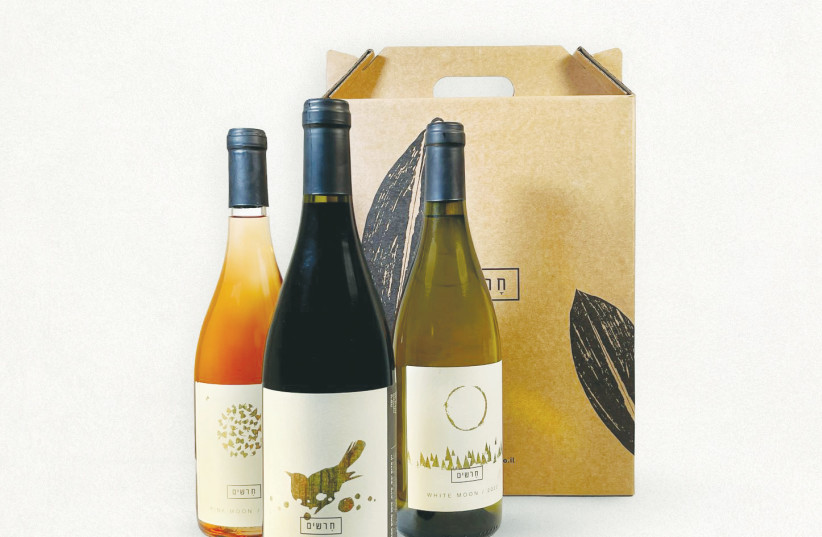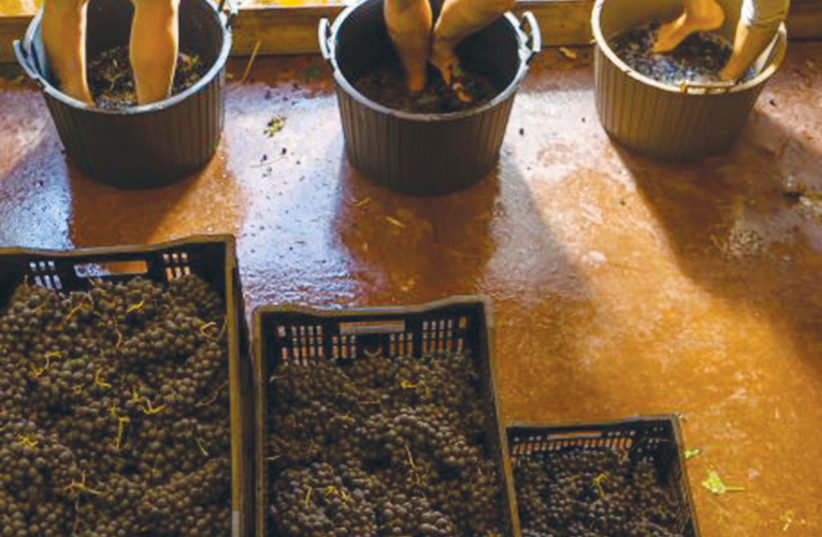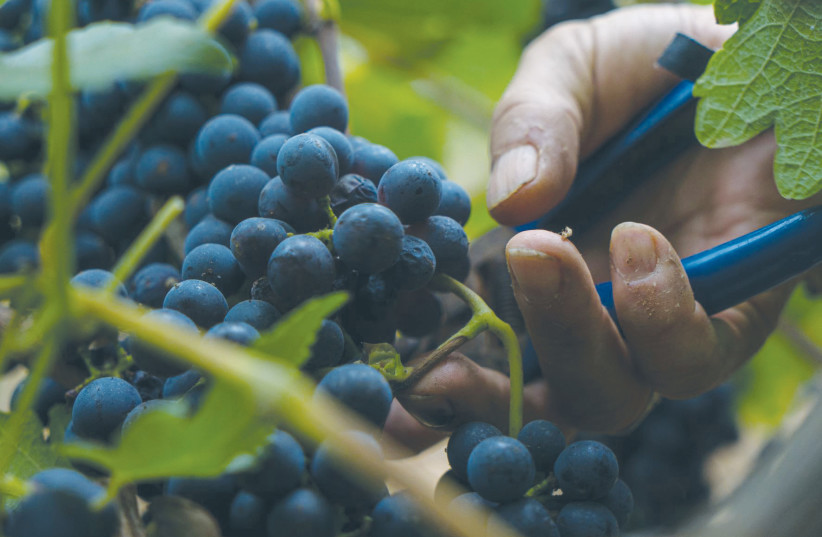Thirty years ago I was new to the country and curious... about the wine scene, of course. There was a winery called Meron Winery, which was Israel’s first modern boutique winery. I had to see it, so I drove up to Mitzpe Harashim. This was before Waze. How I found my way, I don’t know. However, I eventually met up with Koby Tuch. He was a biochemist and biology teacher who had moved with his family to the Harashim village, at an altitude of 850 meters above sea level. The name Harashim (blacksmiths) is taken from a workshop found in an archaeological dig, from the Iron Age period.
In 1986, Koby had moved to Switzerland for a year and was exposed to winemaking for the first time. He returned full of ideas and planted his vineyard in 1987. He then launched his first wine in partnership with Alex Barton, an engineer, who still lives in the village. Funnily enough, a few years ago, I was visiting Yiftah’el Winery (now Meshek Ophir) and bumped into none other than Koby Tuch. We reminisced about that first meeting.
In the last few years, I couldn’t help but notice rave comments about Harashim Winery, based in this same village, high up on Mount Shezor. I understood the vineyard was grown organically, which was nothing new, but also that the wine was made organically too. That is extremely rare in Israel. Furthermore, they were the first Israeli winery to make wine according to a biodynamic protocol. This was more than interesting.
We then began a kind of ritual dance as I invited first one partner, then the other, for an interview. They did not decline, but simply ignored the invitation over quite a few months. For me it was a totally new experience. Their playing hard to get, contrived to make me even more curious. Eventually, I realized, if the mountain will not come to Muhammad, then Muhammad must go to the mountain.
So I drove there, up through the windy paths, which were very steep in some areas, through some Arab villages. At one stage I drove through a mist of low cloud cover and had a flashback. I had exactly the same experience on my previous visit. What I did not know was that Harashim is the rainiest corner of our hot country and this mist or fog is quite common.

The Harashim Winery
Anyway, I found Harashim, parked the car and followed the sign to the winery leading down a little alley, which you could only arrive at by foot. There was no grand signed entrance crying out “Winery.” I arrived at a place that had more the atmosphere of a club or pub, with a deck and a room so crowded with winemaking accessories, including empty tanks and full barrels, that it was hard to navigate my way through it. In the inner room, lay the wines lying in bins, but with depleted inventory. It was clear that selling was not a problem here! I swiftly understood that the winery was not just their cathedral, but the cosmos in totality, from a blade of grass in the vineyard to the farthest star.
“There is a calendar for biodynamic farmers that is influenced by the stars and the moon... it sounds mystical, but it is very scientific.”
Yuval Erlich
My host was the tall and lanky Yuval Erlich, and he was welcoming and charming. Before anything, we walked to the old vineyard, whereupon he took a shovel and dug out a random wodge of earth and proudly showed it to me. It was not lifeless like so much modern agricultural land, but full of microorganisms. Then we moved to the younger vineyard, and under a tarpaulin, he showed me the compost they had lovingly prepared. He was pleased to point out to me a couple of worms wriggling around, doing their stuff. I felt it indicative of the place that these were the first things we saw, before talking about less important things like the winery and wines.
When we settled down, I heard a story of deep friendship from childhood. Yuval Erlich and Gadi Saar were friends and neighbors since they were four years old. They were brought up in this haven, which was a nature reserve, with a unique respect for the environment and a love of the surroundings. These two friends had no idea what they wanted to do, but they both felt they wanted to get their hands dirty in agriculture. As young men, they knew there was an abandoned vineyard in the village and thought this would be a fun project to start with. This was that same vineyard once used by Meron Winery. The winery had changed ownership and gradually disappeared from the market... and there is nothing so sad and forlorn as a forgotten vineyard.
So, with no knowledge of wine or pretension to build a winery, they started to rehabilitate the vineyard with the love and attention that had been lacking. When they arrived as 18-year-olds, it was a jungle of wild, untrained vines. They had to learn how to prune. As the vineyard was organic, it had never been abused by herbicides and chemicals, and so it responded to the TLC. It was also dry farmed, in other words there was no irrigation. The trunks of the vines had grown thicker with age, but the grapes were still high quality, even if yields were small.
They sold the grapes for a few years, before the wine bug grabbed them and the young farmers started to play as winemakers. The first wine they made was 20 liters of Chardonnay in a glass demijohn. In 2009 they made their own experiments by making a number of wines from the same variety, each made to a different recipe. Just for the fun of it. As such they created their own amateur research and development program and by trial and error were able to learn what worked... and more importantly, what they liked. By 2011, they were fully fledged winemakers. The Tel-Hai College Cellar Master Course taught them the rudiments.

The next big step on their journey of discovery was a course on biodynamic agriculture. This opened a window in their minds. For them it was all so logical. They adopted it with open arms, as though everything up to now had been preparing for this moment. The concept of biodynamic agriculture followed the teachings of Rudolf Steiner, an Austrian philosopher-scientist, a hundred years ago. Then a German farmer, Maria Thun, was responsible for devising a calendar of agricultural activity according to the phases of the moon. The idea is that the vineyard is seen as part of the planet and solar system. It is described as “a spiritual-ethical-ecological approach to agriculture.”
Natural composts are used, chemical fertilizers and pesticides are forbidden. The lunar calendar and astrology are taken into account for deciding vineyard activity. As Yuval says, “There is a calendar for biodynamic farmers that is influenced by the stars and the moon... it sounds mystical, but it is very scientific.” Then he reminds me with a wink that the Jewish calendar is also lunar. The most voodoo aspect of biodynamic farming is the burying of manure in a cow horn. You need to be a believer to go thus far, but so much of it is logical and makes sense in these fraught days of concern about the damage we have done to the environment. Gadi and Yuval took up the biodynamic baton with gusto. Viticulture and winemaking became more than mere agriculture and production, it became a spiritual quest for them.
I once asked a winemaker if making the vineyard sustainable and organic made better wine. He answered, “I don’t know, but making the effort makes me feel better about myself.”
So, what are the benefits? Well, I saw for myself the soil full of life, energy and activity. I heard the bird song, which for me symbolized the wild life living at ease with, around and among the vines. I also could not miss the bleats and baas of the sheep, part of the family, which are also co-opted as vineyard workers. Yuval helped me out with other benefits. He told me the results include a better natural acidity and a more balanced set of flavors. This allowed them to produce a more authentic wine, which was more representative of the place. It also improved the longevity of the vine.

They source their wines from two vineyards. The Harashim vineyard has terra rossa soil, and it is surrounded by natural woods. Average rainfall is 900 mm. a year. The winter is cold and rainy, and there is snow during the winter. The partners planted a new plot in 2009. In the middle is a place to sit, drink and soak up the atmosphere. It is probably the most natural wine bar in Israel, which is opened every Friday from the spring to the autumn months. I hear this is a popular meeting place of fun, romance and partying among the vines.
The second is the Zivon vineyard (north of Mount Meron), which was planted in 2006. It is also terra rossa with volcanic elements. Through wine grower Ido Sirkin, this is a leader in biodynamic viticulture, and as such, it is the perfect outside source of grapes for Yuval and Gadi.
As you would expect, their labels are quirky and arty, with a short ditty written by one of the partners, or both, to show their creativity extends to the written word too. My favorite wines were:
Harashim Salamander 2020. A Chardonnay, three months on its skins, in the manner of what is called an orange wine. It is a wine with complexity, flavorful, with a hint of tannin, but still with the look of a very characterful white wine. I thought it was original and different and I preferred it to their regular Chardonnay.
Harashim Pink Moon Rose 2020. A blend of Syrah from Harashim and Petit Verdot from Zivon. It was quite broad flavored for a rosé and I love it. Again, full of character. For me, it is a wine to go with food.
Harashim Wild 2018. 100% Cabernet Sauvignon from the 35-year-old Harashim vineyard. I was really quite moved to taste this wine from the revived vineyard. It was full bodied, fresh, showing good fruit with herbaceous notes and robust flavors on the palate.
Today Yuval and Gadi are young fathers, no doubt passing their love of land and wine to the next generation. The vineyard of Meron Winery’s past has become Harashim Winery’s present. To paraphrase Scrooge, “I will honor the vineyard in my heart and try to keep it all year. I will live in the Past, the Present and the Future.” Harashim Winery ensures that this vineyard with a past, is alive and well at present... and their careful handling will ensure it has a productive future. For Yuval Erlich and Gadi Saar, the future is the name of the game.
The writer is a wine industry insider turned wine writer, who has advanced Israeli wines for 35 years. He is referred to as the English voice of Israeli wine. www.adammontefiore.com
